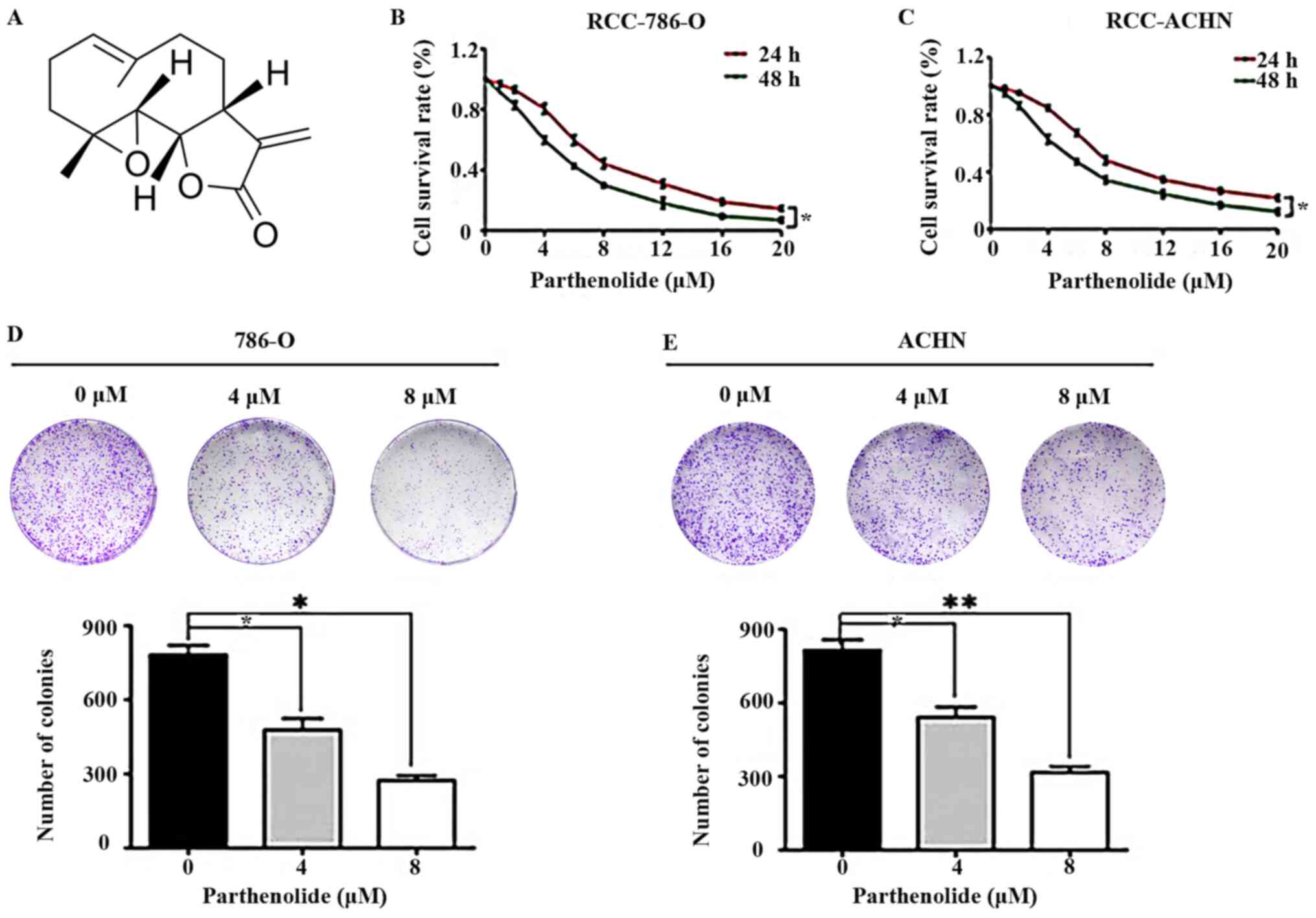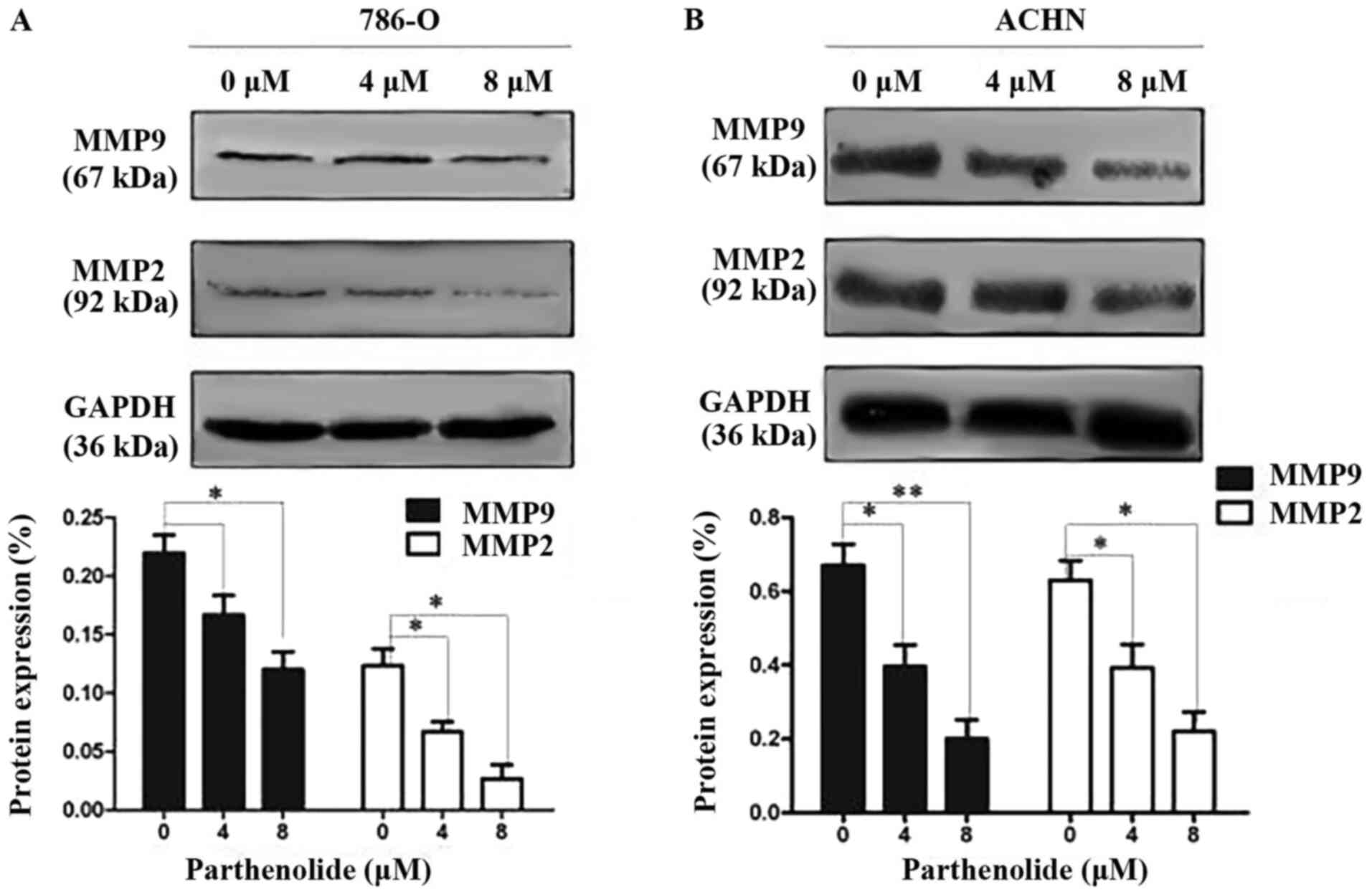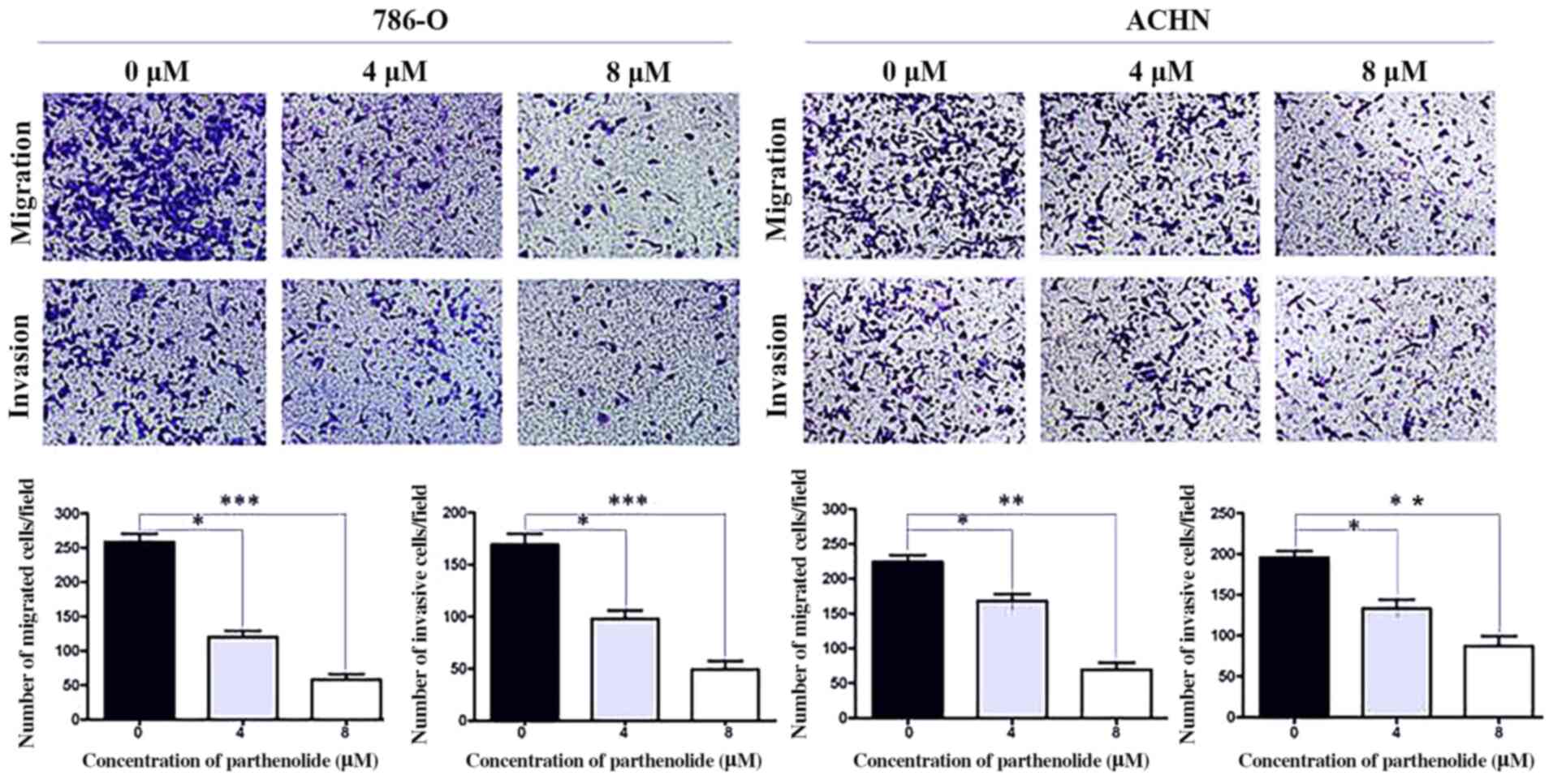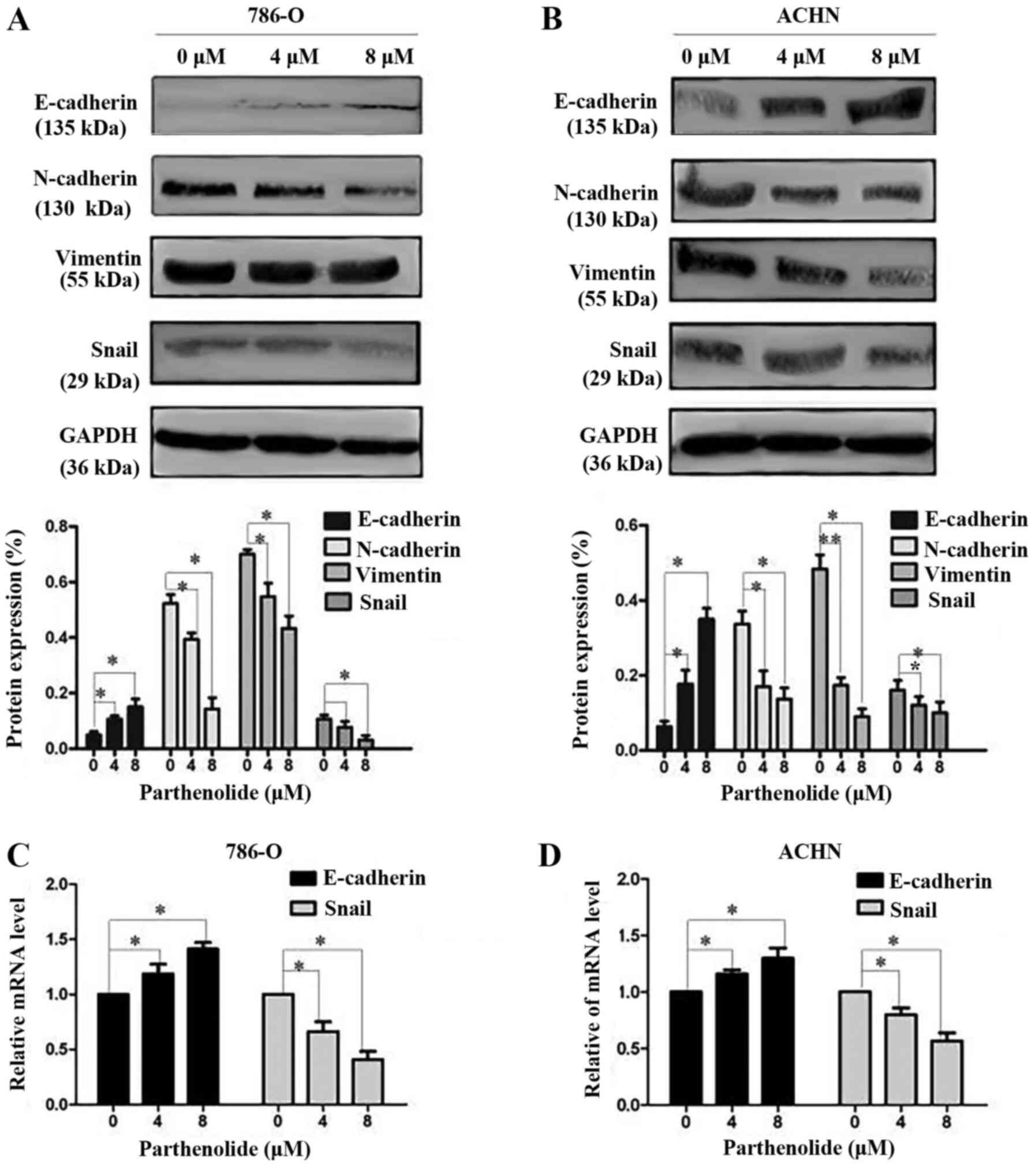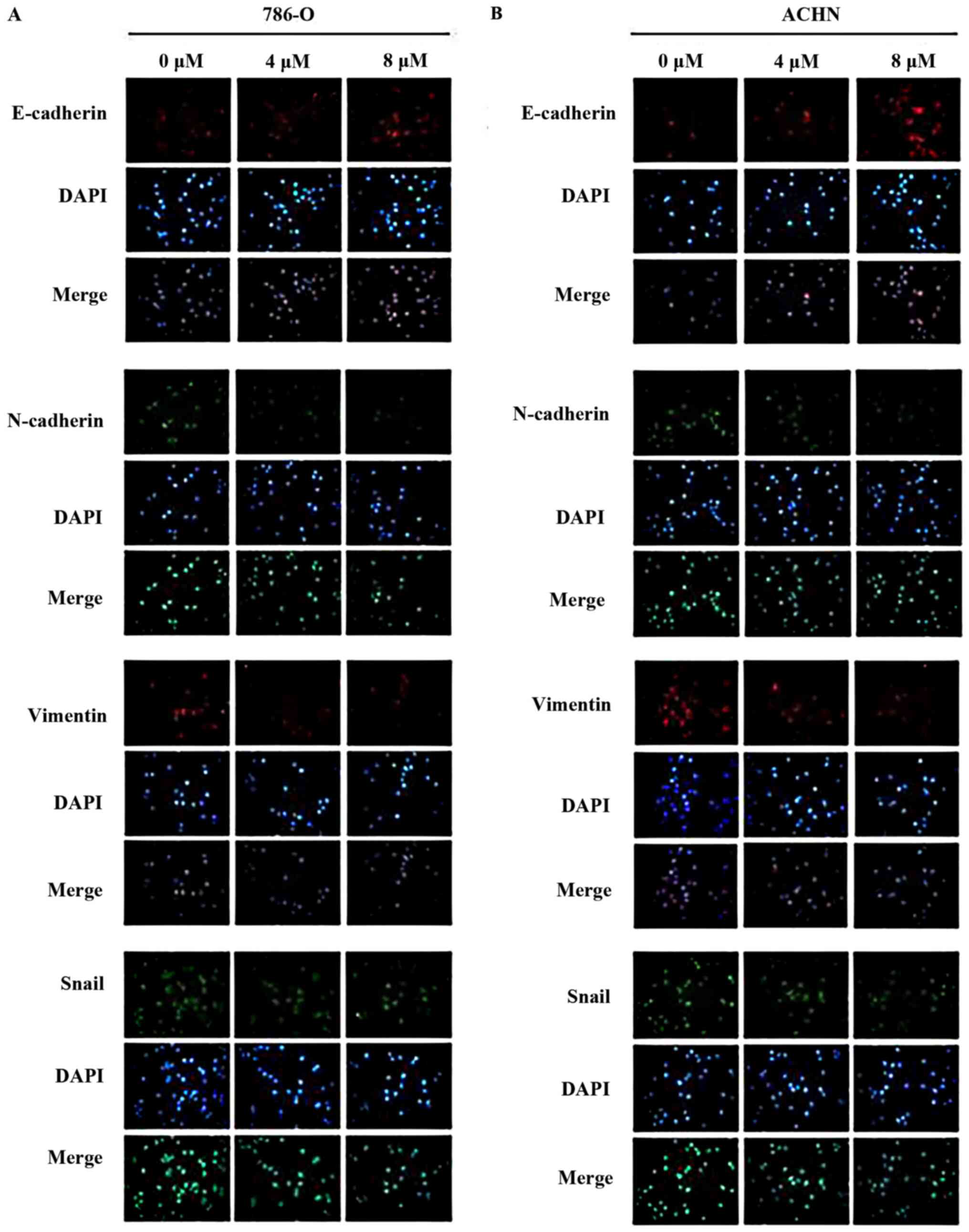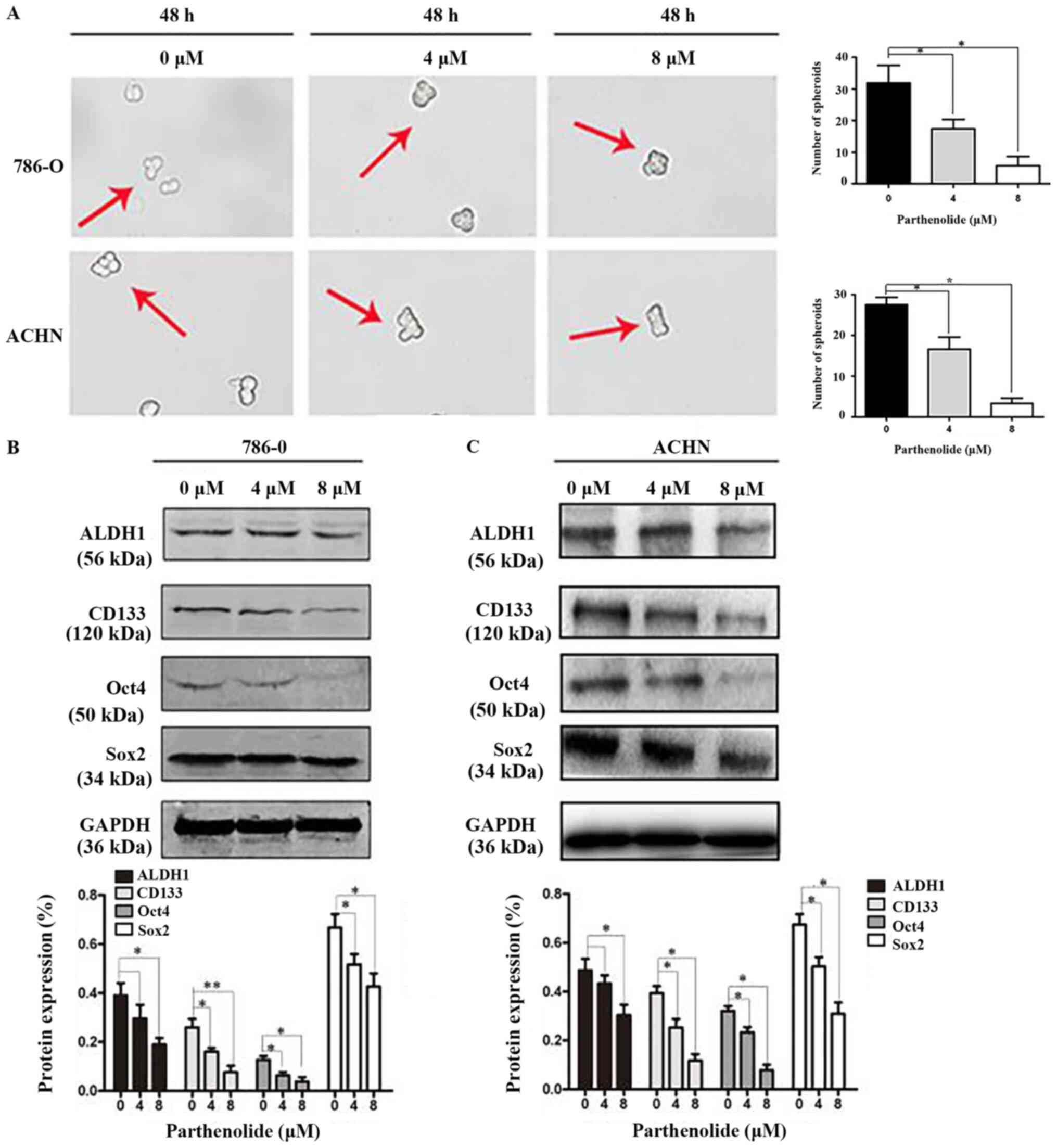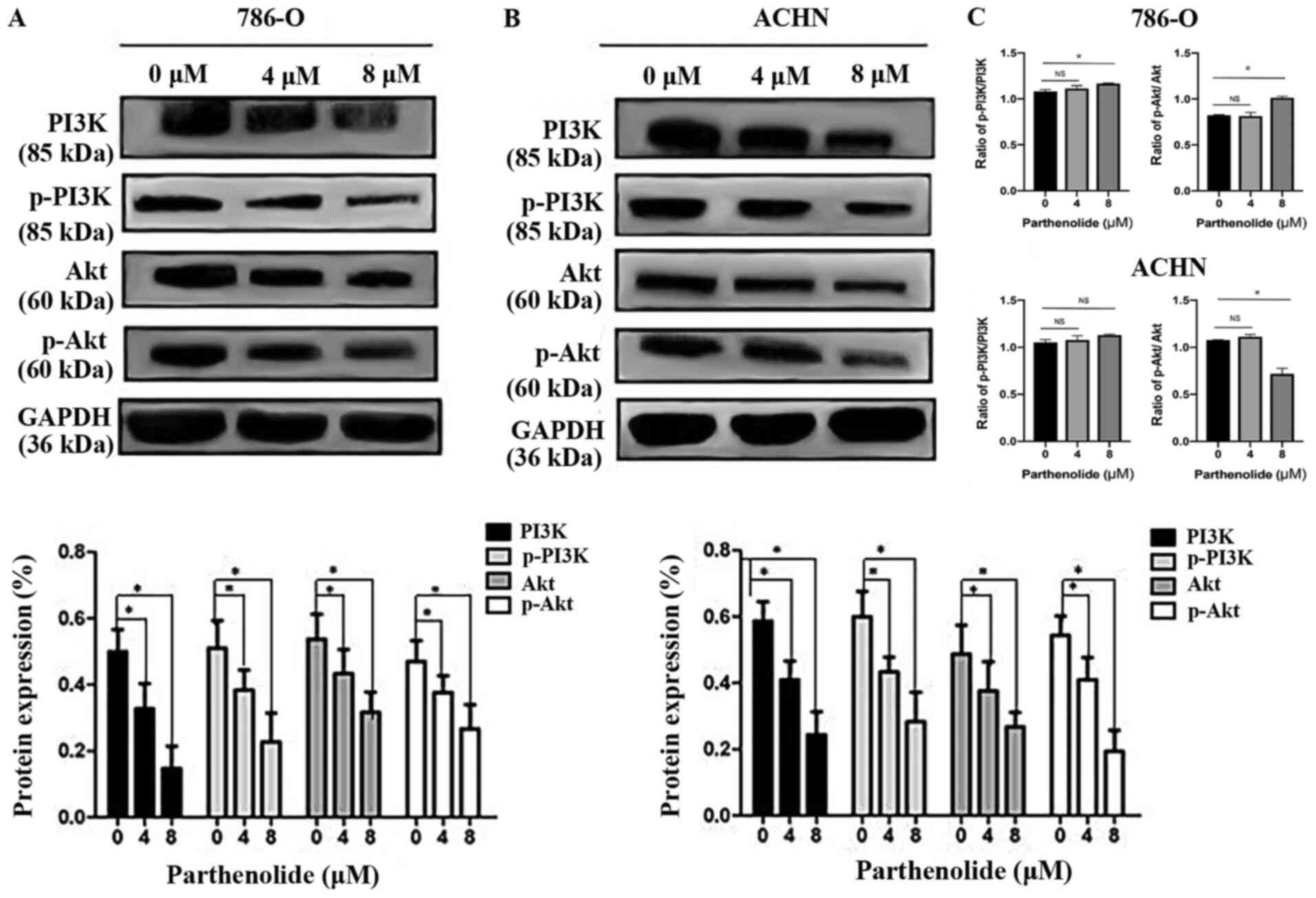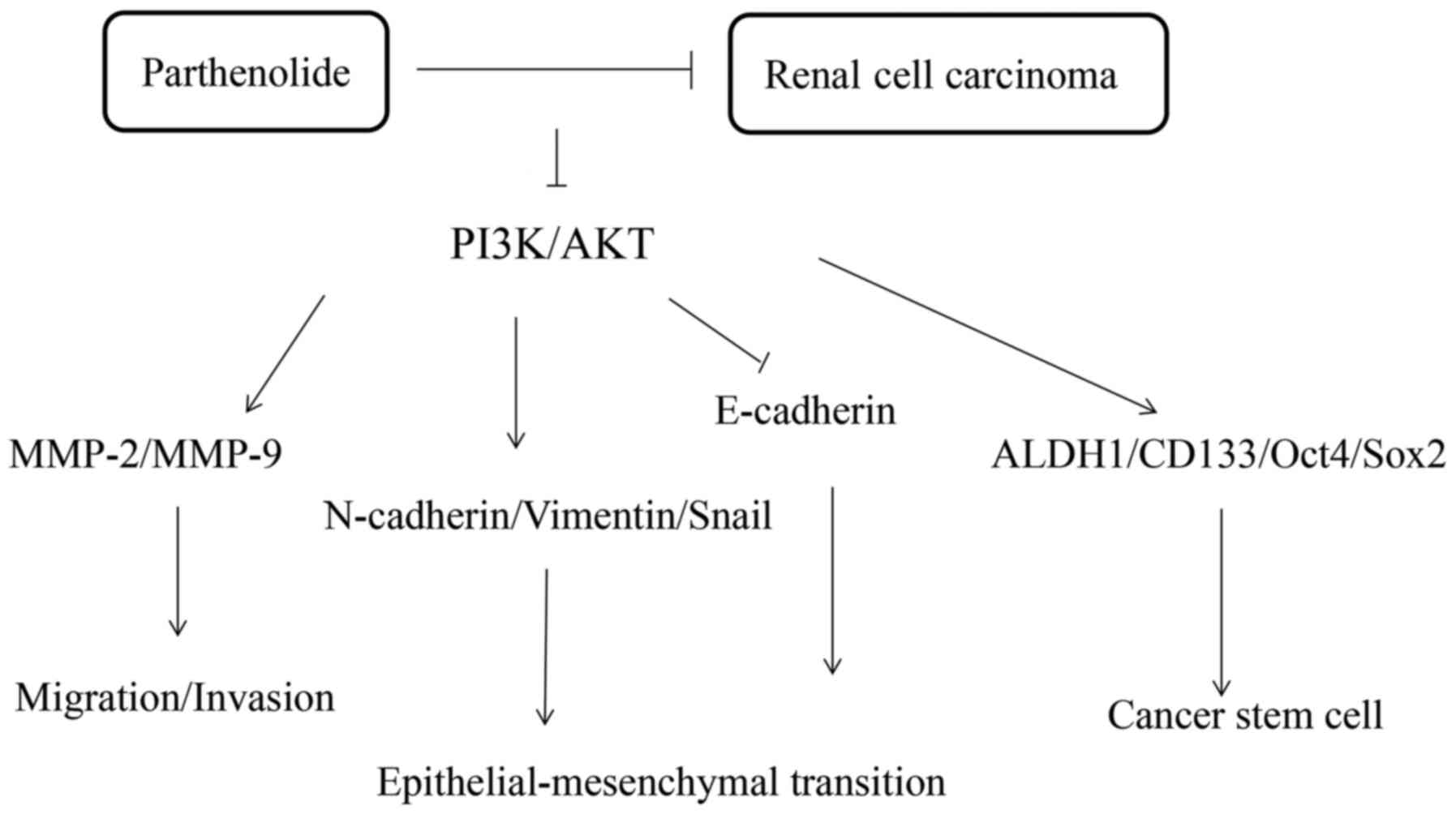|
1
|
Erickson LA: Clear cell renal cell
carcinoma. Mayo Clin Proc. 93:813–814. 2018. View Article : Google Scholar : PubMed/NCBI
|
|
2
|
Liu L, Wang Q, Mao J, Qin T, Sun Y, Yang
J, Han Y, Li L and Li Q: Salinomycin suppresses cancer cell
stemness and attenuates TGF-β-induced epithelial-mesenchymal
transition of renal cell carcinoma cells. Chem Biol Interact.
296:145–153. 2018. View Article : Google Scholar : PubMed/NCBI
|
|
3
|
Siegel RL, Miller KD and Jemal A: Cancer
statistics, 2015. CA Cancer J Clin. 65:5–29. 2015. View Article : Google Scholar : PubMed/NCBI
|
|
4
|
Escudier B, Pluzanska A, Koralewski P,
Ravaud A, Bracarda S, Szczylik C, Chevreau C, Filipek M, Melichar
B, Bajetta E, et al: Bevacizumab plus interferon alfa-2a for
treatment of metastatic renal cell carcinoma: A randomised,
double-blind phase III trial. Lancet. 370:2103–2111. 2007.
View Article : Google Scholar : PubMed/NCBI
|
|
5
|
Singer EA, Gupta GN and Srinivasan R:
Update on targeted therapies for clear cell renal cell carcinoma.
Curr Opin Oncol. 23:283–289. 2011. View Article : Google Scholar : PubMed/NCBI
|
|
6
|
Bork PM, Schmitz ML, Kuhnt M, Escher C and
Heinrich M: Sesquiterpene lactone containing Mexican Indian
medicinal plants and pure sesquiterpene lactones as potent
inhibitors of transcription factor NF-kappaB. FEBS Lett. 402:85–90.
1997. View Article : Google Scholar : PubMed/NCBI
|
|
7
|
Yang C, Yang QO, Kong QJ, Yuan W and Ou
Yang YP: Parthenolide induces reactive oxygen species-mediated
autophagic cell death in human osteosarcoma cells. Cell Physiol
Biochem. 40:146–154. 2016. View Article : Google Scholar : PubMed/NCBI
|
|
8
|
Liu W, Wang X, Sun J, Yang Y, Li W and
Song J: Parthenolide suppresses pancreatic cell growth by
autophagy-mediated apoptosis. Onco Targets Ther. 10:453–461. 2017.
View Article : Google Scholar : PubMed/NCBI
|
|
9
|
Marino S, Bishop RT, Carrasco G, Logan JG,
Li B and Idris AI: Pharmacological inhibition of NFκB reduces
prostate cancer related osteoclastogenesis in vitro and osteolysis
ex vivo. Calcif Tissue Int. 105:193–204. 2019. View Article : Google Scholar : PubMed/NCBI
|
|
10
|
Diepenbruck M and Christofori G:
Epithelial-mesenchymal transition (EMT) and metastasis: Yes, no,
maybe? Curr Opin Cell Biol. 43:7–13. 2016. View Article : Google Scholar : PubMed/NCBI
|
|
11
|
Bai Y, Sha J and Kanno T: The role of
carcinogenesis-related biomarkers in the Wnt pathway and their
effects on epithelial-mesenchymal transition (EMT) in oral squamous
cell carcinoma. Cancers (Basel). 12:5552020. View Article : Google Scholar
|
|
12
|
Han X, Piao L, Yuan X, Wang L, Liu Z and
He X: Knockdown of NSD2 suppresses renal cell carcinoma metastasis
by inhibiting epithelial-mesenchymal transition. Int J Med Sci.
16:1404–1411. 2019. View Article : Google Scholar : PubMed/NCBI
|
|
13
|
Corrò C, Healy ME, Engler S, Bodenmiller
B, Li Z, Schraml P, Weber A, Frew IJ, Rechsteiner M and Moch H:
IL-8 and CXCR1 expression is associated with cancer stem cell-like
properties of clear cell renal cancer. J Pathol. 248:377–389. 2019.
View Article : Google Scholar : PubMed/NCBI
|
|
14
|
Livak KJ and Schmittgen TD: Analysis of
relative gene expression data using real-time quantitative PCR and
the 2(-Delta Delta C(T)) method. Methods. 25:402–408. 2001.
View Article : Google Scholar
|
|
15
|
Xu C, Sun X, Qin S, Wang H, Zheng Z, Xu S,
Luo G, Liu P, Liu J, Du N, et al: Let-7a regulates mammosphere
formation capacity through Ras/NF-κB and Ras/MAPK/ERK pathway in
breast cancer stem cells. Cell Cycle. 14:1686–1697. 2015.
View Article : Google Scholar :
|
|
16
|
Gargalionis AN, Sarlani E, Stofas A,
Malakou LS, Adamopoulos C, Bamias A, Boutati E, Constantinides CA,
Stravodimos KG, Piperi C, et al: Polycystin-1 induces activation of
the PI3K/AKT/mTOR pathway and promotes angiogenesis in renal cell
carcinoma. Cancer Lett. 489:135–143. 2020. View Article : Google Scholar : PubMed/NCBI
|
|
17
|
Siegel RL, Miller KD and Jemal A: Cancer
statistics, 2018. CA Cancer J Clin. 68:7–30. 2018. View Article : Google Scholar : PubMed/NCBI
|
|
18
|
Murphy JJ, Heptinstall S and Mitchell JR:
Randomised double-blind placebo-controlled trial of feverfew in
migraine prevention. Lancet. 2:189–192. 1988. View Article : Google Scholar : PubMed/NCBI
|
|
19
|
Ghorbani-Abdi-Saedabad A, Hanafi-Bojd MY,
Parsamanesh N, Tayarani-Najaran Z, Mollaei H and Hoshyar R:
Anticancer and apoptotic activities of parthenolide in combination
with epirubicin in mda-mb-468 breast cancer cells. Mol Biol Rep.
47:5807–5815. 2020. View Article : Google Scholar : PubMed/NCBI
|
|
20
|
Berdan CA, Ho R, Lehtola HS, To M, Hu X,
Huffman TR, Petri Y, Altobelli CR, Demeulenaere SG, Olzmann JA, et
al: Parthenolide covalently targets and inhibits focal adhesion
kinase in breast cancer cells. Cell Chem Biol. 26:1027–1035.e22.
2019. View Article : Google Scholar : PubMed/NCBI
|
|
21
|
Dandawate PR, Subramaniam D, Jensen RA and
Anant S: Targeting cancer stem cells and signaling pathways by
phytochemicals: Novel approach for breast cancer therapy. Semin
Cancer Biol. 40-41:192–208. 2016. View Article : Google Scholar : PubMed/NCBI
|
|
22
|
Freund RRA, Gobrecht P, Moser P, Fischer D
and Arndt HD: Synthesis and biological profiling of parthenolide
ether analogs. Org Biomol Chem. 17:9703–9707. 2019. View Article : Google Scholar : PubMed/NCBI
|
|
23
|
Liao L, Zhang L, Yang M, Wang X, Huang W,
Wu X, Pan H, Yuan L, Huang W, Wu Y and Guan J: Expression profile
of SYNE3 and bioinformatic analysis of its prognostic value and
functions in tumors. J Transl Med. 18:3552020. View Article : Google Scholar : PubMed/NCBI
|
|
24
|
Li X, Kong L, Yang Q, Duan A, Ju X, Cai B,
Chen L, An T and Li Y: Parthenolide inhibits ubiquitin-specific
peptidase 7 (USP7), Wnt signaling, and colorectal cancer cell
growth. J Biol Chem. 295:3576–3589. 2020. View Article : Google Scholar : PubMed/NCBI
|
|
25
|
Gonzalez-Avila G, Sommer B,
García-Hernández AA and Ramos C: Matrix metalloproteinases' role in
tumor microenvironment. Adv Exp Med Biol. 1245:97–131. 2020.
View Article : Google Scholar : PubMed/NCBI
|
|
26
|
Bates AL, Pickup MW, Hallett MA, Dozier
EA, Thomas S and Fingleton B: Stromal matrix metalloproteinase 2
regulates collagen expression and promotes the outgrowth of
experimental metastases. J Pathol. 235:773–783. 2015. View Article : Google Scholar :
|
|
27
|
Tiwari N, Gheldof A, Tatari M and
Christofori G: EMT as the ultimate survival mechanism of cancer
cells. Semin Cancer Biol. 22:194–207. 2012. View Article : Google Scholar : PubMed/NCBI
|
|
28
|
Luo F, Zhao Y and Liu J: Cell adhesion
molecule 4 suppresses cell growth and metastasis by inhibiting the
Akt signaling pathway in non-small cell lung cancer. Int J Biochem
Cell Biol. 123:1057502020. View Article : Google Scholar : PubMed/NCBI
|
|
29
|
Sakamoto K, Imanishi Y, Tomita T, Shimoda
M, Kameyama K, Shibata K, Sakai N, Ozawa H, Shigetomi S, Fujii R,
et al: Overexpression of SIP1 and downregulation of E-cadherin
predict delayed neck metastasis in stage I/II oral tongue squamous
cell carcinoma after partial glossectomy. Ann Surg Oncol.
19:612–619. 2012. View Article : Google Scholar
|
|
30
|
Xi W, Sonam S, Beng Saw T, Ladoux B and
Teck Lim C: Emergent patterns of collective cell migration under
tubular confinement. Nat Commun. 8:15172017. View Article : Google Scholar : PubMed/NCBI
|
|
31
|
Dattoli AA, Hink MA, DuBuc TQ, Teunisse
BJ, Goedhart J, Röttinger E and Postma M: Domain analysis of the
Nematostella vectensis SNAIL ortholog reveals unique nucleolar
localization that depends on the zinc-finger domains. Sci Rep.
5:121472015. View Article : Google Scholar : PubMed/NCBI
|
|
32
|
Georgakopoulos-Soares I, Chartoumpekis DV,
Kyriazopoulou V and Zaravinos A: EMT factors and metabolic pathways
in cancer. Front Oncol. 10:4992020. View Article : Google Scholar : PubMed/NCBI
|
|
33
|
Škovierová H, Okajčeková T, Strnádel J,
Vidomanová E and Halašová E: Molecular regulation of
epithelial-to-mesenchymal transition in tumorigenesis (Review). Int
J Mol Med. 41:1187–1200. 2018.
|
|
34
|
Jiang N, Dai Q, Su X, Fu J, Feng X and
Peng J: Role of PI3K/AKT pathway in cancer: The framework of
malignant behavior. Mol Biol Rep. 47:4587–4629. 2020. View Article : Google Scholar : PubMed/NCBI
|















